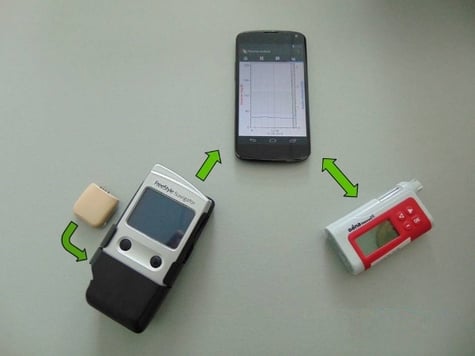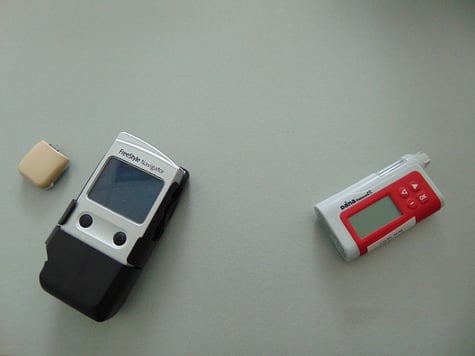International trial shows that 12-week day-and-night unsupervised use of an artificial pancreas system is feasible in adults with type 1 diabetes
The results of a multicenter randomized, twelve week free-living home trial have just been published in the New England Journal of Medicine [1], involving 24-hour closed loop (Figure) in adults with type 1 diabetes. Profil Germany is proud to have been an integral part of this study.
The study design
Profil, Neuss, Germany, the University of Cambridge, UK, and the University of Graz, Austria – partners within the EU-funded AP@home project (www.apathome.eu) - carried out the study and compared 12-week day-and-night closed loop utilizing a model predictive control algorithm to 12 weeks of sensor augmented insulin pump therapy - with identical pump and continuous glucose monitoring system (CGMS) during both periods. A 4-6 week wash-out period separated the two interventions. Patients underwent sufficient training on the study insulin pump and CGMS followed by a 4-6 week optimization run-in period with weekly visits at the center. During closed-loop, participants used the closed-loop system day-and-night – at home, work and vacation, including travelling within Europe. As a safety precaution – during the first 2 weeks of closed-loop – they should neither travel abroad nor do exercise. Meal boluses were performed by entering the carbohydrate amount and fingerstick capillary glucose measurements into the standard bolus calculator. Subjects could call a 24-hour telephone helpline in the event of study-related issues.
What are the most important study results?
In total 33 adults with type 1 diabetes were randomized, one participant withdrew during the wash-out phase for reasons not related to the study.
The primary endpoint, i.e. the proportion of time when CGMS glucose was in the target range between 70 and 180 mg/dl during the 12 week interventions, was significantly improved by a mean of 11% (p<0.001) during closed loop. Day-and-night closed-loop significantly reduced mean glucose (p<0.001) and time spent above target (p<0.001), as well as time glucose was <70 mg/dl (p=0.016) and <50 mg/dl (p<0.001). Following optimization of sensor-augmented pump treatment during run-in, HbA1c was further reduced (p=0.002) compared to the control intervention. Day- and night-time insulin delivery was comparable during both interventions. Higher basal insulin doses during closed-loop were leveled out by lower bolus doses (p<0.001 and p=0.002, respectively).

Figure 1: Closed Loop therapy
Closed-loop was utilized for a median of 20.2 hours per day compared to 22.7 hours of CGMS wear during the control period.During the entire study there was one episode of severe hypoglycaemia during closed-loop when closed-loop was not operational and the participant was receiving standard insulin pump infusion rate.

Figure 2: CGMS-based insulin pump therapy (Open Loop)
What do these results tell us?
Our findings show the feasibility, safety and efficacy of extended use of closed loop at home over twelve weeks during free daily living without close supervision. Several metabolic parameters significantly improved with reduction in hypoglycaemia at the same time.
What are the challenges for the future?
Further optimization concerning both algorithm and devices could enable the artificial pancreas becoming a promising future therapeutic option for people with type 1 diabetes. Read more about Profil expertise in the area of artificial pancreas, or read more ont he AP@home project.
References
[1] Thabit H, Tauschmann M, Allen JM, Leelarathna L, Hartnell S, Wilinska ME, Acerini CL, Dellweg S, Benesch C, Heinemann L, Mader JK, Holzer M, Kojzar H, Exall J, Yong J, Pichierri J, Barnard KD, Kollman C, Cheng P, Hindmarsh PC, Campbell FM, Arnolds S, Pieber TR, Evans ML, Dunger DB, Hovorka R, on behalf of APCam consortium and AP@home consortium. Free-living home use of an artificial beta cell in type 1 diabetes. N Engl J Med 17 Sep 2015. DOI:10.1056/NEJMoa1509351




